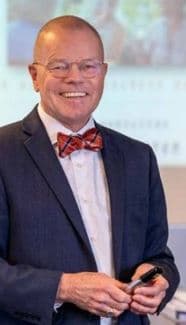What can, or rather, should a hearing care professional do to distinguish themselves from others? Oliver von Borstel, the face of Non-Manipulative Ethical Selling, offers his advice:
“Stop selling, start helping! During my business trip in Australia at the beginning of this year, I met Jan, 92 years old, in Melbourne, Australia at a family party. A Dutchman with significant hearing loss and old hearing aids. Jan was socially engaged at parties and gatherings, but he couldn’t understand others without lip reading. The effect? Sadly, many avoided him because he didn’t understand them or gave the wrong answers.
I advised Jan to visit a hearing care professional who applies the Non-Manipulative Ethical Selling concept. He did so and he received convincing advice about the most optimal hearing solution for him.
He wears now advanced hearing aids. The most positive thing for him is not the amplification of sound, but that family members are now proactively talking to him and he feels, therefore, not socially isolated. The quality of life of several people has thus improved: Jan’s and those of family members as well! A mutual hearing gain is realized and a fan has been created.”
How can a hearing care professional respond to this? Oliver highlights the points of attention:
Empathy & the Person Centered Care (PCC) Mindset
Put your focus on the needs and hidden needs of your customer and spouse and/or family members, instead of just focusing at the results of hearing tests. Analyze circumstances and needs which would improve the quality of life.
What are the hidden needs of the customer and/or spouse they are not aware of? This can easily be found out by asking individual and through the use of open ended questions.
Cocktail Party Effect and Improved Quality of Life
Just like with Jan, many people with hearing loss suffer from social isolation or running the risk getting into it. It is never good that family members avoid contact with hearing impaired, the client suffers but family members as well.
Based on more than ten years experiences as a Hearing Instrument Specialist (HIS) Personal Coach I learned that approximately 80% of clients have the #1 need, namely, understanding spoken language in complex environments. The one more than the other.
Honestly: who doesn’t have that? In every assessment meeting with a client put the goal on improving the quality of life of all the persons involved.
Never put the focus on ‘just selling something’…it might be fatal!
Which Open Questions to Ask?
First, analyze needs individually and as an expert. Proactively listen to what is said after you asked open ended questions. Try to understand ‘what is not said’.
By asking open ended questions you will learn many individual needs and also hidden details. All the answers to these questions, from the customer and / or partner, will help you to find the individual best and most optimal hearing aid solution. By doing so you will not need to ‘close the deal’ or to ‘deal with objections’ (often necessary in a hard selling approach!), but you are able to convince the client with PCC arguments and facts because you focused on his/her life situation.
Good open questions which reflect on quality of life improvement issues are, e.g.
- Which social engagements do you have?
- What is your favorite TV program?
- What do you do in your spare time?
- To which music are you listening often?
- and, individually
- What does your tinnitus mean to you?”
Expert’s Attitude & Behavior
The customer expects a professional advice about a hearing solution and not a ‘sales pitch’. More important, every customer expects an advice he/she can accept. After all, it always must be about the individual best and most optimal hearing solution!
Are your HIS/Staff members able to convince customers of an investment according to the philosophy of Non-Manipulative Ethical Selling?
Think about it: what would happen if your personnel masters this, not creating ‘happy customers’ but real Fans? In business it is all about creating (customer) Fans.
Having fans proactively spread positive word-of-mouth about you and your dispensing business. It will make your clinic and staff different from competitors. Creating Fans: I call this pure business development.
https://youtu.be/t6Rs4vx89YU
Conclusion
I apply the Steve Jobs/Apple business philosophy: “Get closer to customers than ever. So close in fact that you tell them what they need before they realize it themselves.”
Your expertise and professional services set you apart from competitors, and you will create fans. Customers will not forget your services and recommend you to others. Pure business development!
 Oliver F. von Borstel is an expert in Business Development. His focus is on PCC and the non-manipulative Ethical Selling concept which he developed years ago. Internationally he helped many independent dispensers to improve their businesses and turnover/profit results. More information of Oliver’s Training Workshops you will find on www.MastersOfBusinessDevelopment.com or send an email to [email protected]
Oliver F. von Borstel is an expert in Business Development. His focus is on PCC and the non-manipulative Ethical Selling concept which he developed years ago. Internationally he helped many independent dispensers to improve their businesses and turnover/profit results. More information of Oliver’s Training Workshops you will find on www.MastersOfBusinessDevelopment.com or send an email to [email protected]






